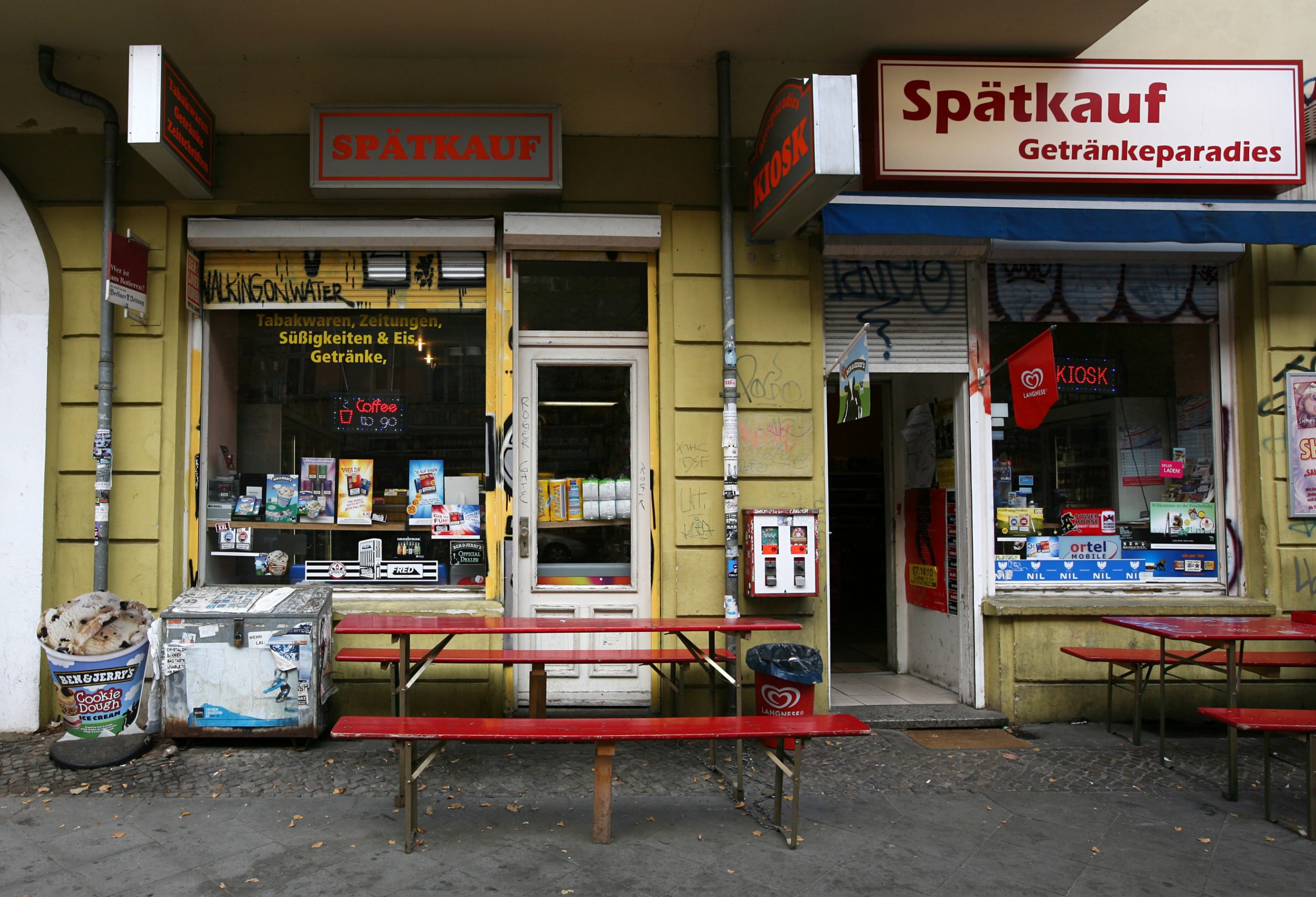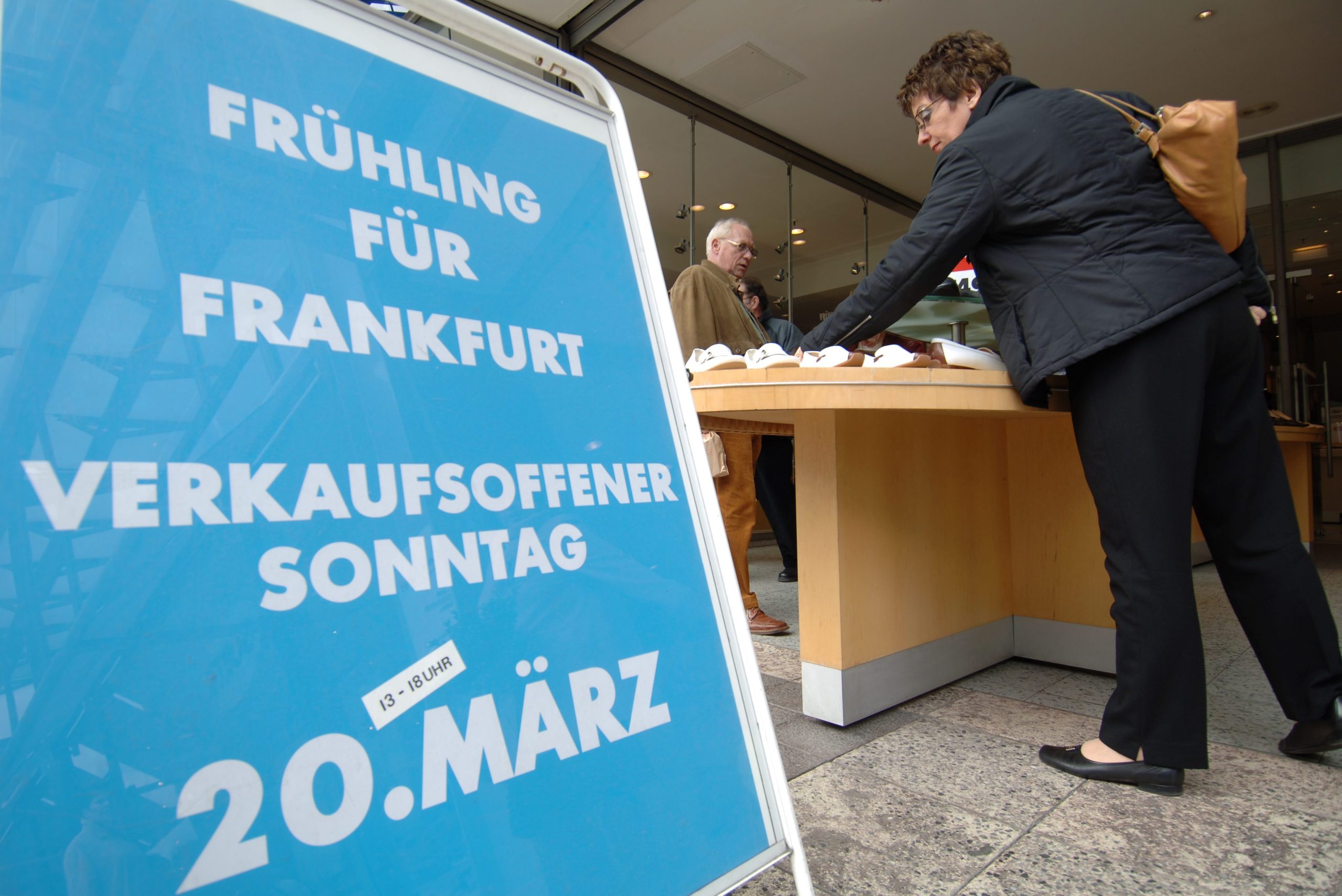Why are shops in Germany closed on Sundays - and will it ever change?

Germany's strict ban on shops opening on Sundays can be a shock to foreigners. We looked at the culture around it, and spoke to one of the country's largest trade unions to find out if things are ever likely to change.
It’s Sunday. You’ve invited people for dinner, but you’ve forgotten the most important ingredient. Tough luck - you’ll either have to do without or wait until Monday because your local shops are shut.
Most of us are familiar with this inconvenience, and perhaps you've even found yourself screaming: “Why?” in frustration in front of a locked-up supermarket.
But it's something us adopted Germans have had to get used to. We decided to take a look at the reasons behind Germany's ban on Sunday shopping - and to find out if it might change in future.
Where does the rule come from?
The Sonntagsruhe or 'Sunday rest' principle is an integral part of German culture, so much so that it is enshrined in the German constitution (Grundgesetz).
Article 140 of the law, which has remained unchanged since 1919, says: "Sundays and state-recognised public holidays remain protected by law as days of rest from work and spiritual upliftment."
But the practice of not working on Sunday has been around for much longer. The idea that the seventh day of the week is a day of rest dates back to the old testament and was declared a general day of rest across the Roman Empire as early as 321, by Roman Emperor Constantine.
In the centuries since, however, most of Europe has gradually relaxed the strict ban on commercial activities on Sundays.
But in Germany, the rules remain restrictive. It's unlikely to change anytime soon partly because of religious reasons, and also in relation to the interests of workers.
Germany's biggest trade union Verdi spelled out their view. "It's not 'modern' to work seven days a week," they told The Local. "That's the Middle Ages."
What exactly does the law mean?
On the face of it, the German law forbids all forms of work on Sundays and public holidays, though numerous exceptions are laid out in the Working Time Act.
As well as emergency and rescue services, hospitals, nursing and care facilities, exceptions include cultural and sporting activities, and the hospitality sector.
Another notable exemption to the rule is bakeries, which are allowed to open for three hours on Sundays - which is why you may often find a long queue at your local baker if you want to get your freshly baked Brötchen on Sunday morning.

A saleswoman reaches for a loaf of bread in a bakery. Photo: picture alliance/dpa | Mohssen Assanimoghaddam
Illustrating how seriously the rule can be taken in Germany, there have even been cases of bakeries being sued for selling bread for too long on Sundays.
Shops, however, aren’t exempt from the rule and, the only way they can legally open on a Sunday is on a so-called verkaufsoffener Sonntag - Sunday trading day.
In most federal states, shops are allowed to open on between four and eight Sundays per year, and the States can decide when these should be. The chosen days must, however, be linked to a relevant occasion - such as a local festival, a market, a trade fair, or a similar event.
Sunday openings also have to be recognisable as an exception to the general rule and Sunday openings that have already been approved can often be later overturned by the courts.
How strictly is the rule enforced?
Retailers who break the rules and open for business on Sunday can face fines ranging between €500 and €2,500.
The strictness of enforcement can vary widely between different regions.
In Berlin, for example, you can still find lots of Spätis (late night shops) open on Sundays. Although this is technically illegal, the authorities in the capital seem to take more of a relaxed approach to enforcement than in other states.

A "Späti" late-night shop in Berlin. Photo: picture alliance/dpa | Florian Schuh
In the traditionally Catholic state of Bavaria, for example, the law is much more strictly guarded and enforced.
READ ALSO: Why Germany has strict shop opening hours
Is the law likely to change?
A survey by Spiegel in 2017 showed that 61 percent of Germans wanted to be able to shop on a Sunday, and this desire is shared by the trade industry.
The German Trade Association, for example, which represents around 400,000 independent companies, has strongly criticised Germany’s refusal to budge on the issue of Sunday openings on several occasions and argued that Sunday opening is also popular with staff, with many shop assistants appreciating the work in a more relaxed atmosphere.
In its latest statement on the issue, the association stated that, especially after following the economic impact of the pandemic, many retailers would benefit greatly from being able to open on Sundays.
READ ALSO:
- Shopping: Here’s how the pandemic has hit German spending habits
- How the cost of living is changing German spending habits
“It is remarkable that in no other EU country Sunday opening is as restricted as in Germany," the association said. "Even in strongly Catholic EU countries such as Italy and Poland, shoppers can generally shop on Sundays. The same applies to France, although they place great value on culture and socialising."
However, even if there is a widespread desire in some quarters to allow Sunday trading, an amendment to the constitution would require the consent of two-thirds of the German parliament. Also, there remains strong opposition to changing the rule from many workers’ groups and trade unions.
Trade union Verdi, which regularly files complaints against states and organisations which seek to deviate from Sunday trading restrictions, said that Sunday rest is still very important for workers.

A sign reads “Spring for Frankfurt – Sunday trading day” in front of a shoe shop in Frankfurt. Photo: picture-alliance/ dpa/dpaweb | Arne Dedert
A spokesperson said: “We have just one day a week when employers can't stop us from going to football together, meeting friends, attending cultural events, or spending free time with the whole family.
"And we want to keep it that way. There are six days a week when we can go shopping, take the car to the garage, do our banking, or get the package delivered from the online retailer. On Sunday, there has to be peace and quiet.”
The Verdi spokesperson added that it's important to think about "work-life balance, and not about being available 24/7 for a company".
We also asked the union if the law looks set to change in the near future.
The spokesperson said: “Sunday, which is a non-working day for most people, has so far been protected by the majority of political parties in Germany.
"Verdi, with its almost two million members, continues to work to ensure that working on Sunday does not become an everyday occurrence.”
So it appears that the culture shock for many non-Germans of shops being closed on Sundays won't change anytime soon.
READ ALSO: From nudity to sandwiches - the biggest culture shocks for foreigners in Germany
Comments (4)
See Also
It’s Sunday. You’ve invited people for dinner, but you’ve forgotten the most important ingredient. Tough luck - you’ll either have to do without or wait until Monday because your local shops are shut.
Most of us are familiar with this inconvenience, and perhaps you've even found yourself screaming: “Why?” in frustration in front of a locked-up supermarket.
But it's something us adopted Germans have had to get used to. We decided to take a look at the reasons behind Germany's ban on Sunday shopping - and to find out if it might change in future.
Where does the rule come from?
The Sonntagsruhe or 'Sunday rest' principle is an integral part of German culture, so much so that it is enshrined in the German constitution (Grundgesetz).
Article 140 of the law, which has remained unchanged since 1919, says: "Sundays and state-recognised public holidays remain protected by law as days of rest from work and spiritual upliftment."
But the practice of not working on Sunday has been around for much longer. The idea that the seventh day of the week is a day of rest dates back to the old testament and was declared a general day of rest across the Roman Empire as early as 321, by Roman Emperor Constantine.
In the centuries since, however, most of Europe has gradually relaxed the strict ban on commercial activities on Sundays.
But in Germany, the rules remain restrictive. It's unlikely to change anytime soon partly because of religious reasons, and also in relation to the interests of workers.
Germany's biggest trade union Verdi spelled out their view. "It's not 'modern' to work seven days a week," they told The Local. "That's the Middle Ages."
What exactly does the law mean?
On the face of it, the German law forbids all forms of work on Sundays and public holidays, though numerous exceptions are laid out in the Working Time Act.
As well as emergency and rescue services, hospitals, nursing and care facilities, exceptions include cultural and sporting activities, and the hospitality sector.
Another notable exemption to the rule is bakeries, which are allowed to open for three hours on Sundays - which is why you may often find a long queue at your local baker if you want to get your freshly baked Brötchen on Sunday morning.

Illustrating how seriously the rule can be taken in Germany, there have even been cases of bakeries being sued for selling bread for too long on Sundays.
Shops, however, aren’t exempt from the rule and, the only way they can legally open on a Sunday is on a so-called verkaufsoffener Sonntag - Sunday trading day.
In most federal states, shops are allowed to open on between four and eight Sundays per year, and the States can decide when these should be. The chosen days must, however, be linked to a relevant occasion - such as a local festival, a market, a trade fair, or a similar event.
Sunday openings also have to be recognisable as an exception to the general rule and Sunday openings that have already been approved can often be later overturned by the courts.
How strictly is the rule enforced?
Retailers who break the rules and open for business on Sunday can face fines ranging between €500 and €2,500.
The strictness of enforcement can vary widely between different regions.
In Berlin, for example, you can still find lots of Spätis (late night shops) open on Sundays. Although this is technically illegal, the authorities in the capital seem to take more of a relaxed approach to enforcement than in other states.

In the traditionally Catholic state of Bavaria, for example, the law is much more strictly guarded and enforced.
READ ALSO: Why Germany has strict shop opening hours
Is the law likely to change?
A survey by Spiegel in 2017 showed that 61 percent of Germans wanted to be able to shop on a Sunday, and this desire is shared by the trade industry.
The German Trade Association, for example, which represents around 400,000 independent companies, has strongly criticised Germany’s refusal to budge on the issue of Sunday openings on several occasions and argued that Sunday opening is also popular with staff, with many shop assistants appreciating the work in a more relaxed atmosphere.
In its latest statement on the issue, the association stated that, especially after following the economic impact of the pandemic, many retailers would benefit greatly from being able to open on Sundays.
READ ALSO:
- Shopping: Here’s how the pandemic has hit German spending habits
- How the cost of living is changing German spending habits
“It is remarkable that in no other EU country Sunday opening is as restricted as in Germany," the association said. "Even in strongly Catholic EU countries such as Italy and Poland, shoppers can generally shop on Sundays. The same applies to France, although they place great value on culture and socialising."
However, even if there is a widespread desire in some quarters to allow Sunday trading, an amendment to the constitution would require the consent of two-thirds of the German parliament. Also, there remains strong opposition to changing the rule from many workers’ groups and trade unions.
Trade union Verdi, which regularly files complaints against states and organisations which seek to deviate from Sunday trading restrictions, said that Sunday rest is still very important for workers.

A spokesperson said: “We have just one day a week when employers can't stop us from going to football together, meeting friends, attending cultural events, or spending free time with the whole family.
"And we want to keep it that way. There are six days a week when we can go shopping, take the car to the garage, do our banking, or get the package delivered from the online retailer. On Sunday, there has to be peace and quiet.”
The Verdi spokesperson added that it's important to think about "work-life balance, and not about being available 24/7 for a company".
We also asked the union if the law looks set to change in the near future.
The spokesperson said: “Sunday, which is a non-working day for most people, has so far been protected by the majority of political parties in Germany.
"Verdi, with its almost two million members, continues to work to ensure that working on Sunday does not become an everyday occurrence.”
So it appears that the culture shock for many non-Germans of shops being closed on Sundays won't change anytime soon.
READ ALSO: From nudity to sandwiches - the biggest culture shocks for foreigners in Germany
Join the conversation in our comments section below. Share your own views and experience and if you have a question or suggestion for our journalists then email us at [email protected].
Please keep comments civil, constructive and on topic – and make sure to read our terms of use before getting involved.
Please log in here to leave a comment.